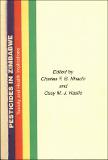| dc.contributor.author | Nhari, David B. | |
| dc.coverage.spatial | Zimbabwe. | en |
| dc.date.accessioned | 2016-03-14T12:59:10Z | |
| dc.date.available | 2016-03-14T12:59:10Z | |
| dc.date.issued | 1996 | |
| dc.identifier.citation | Nhari, D.B. (1996) Acute pesticide poisoning: government analyst laboratory records. In: Nhachi, C.F.B and Kasilo, O.M.J. (eds.) Pesticides in Zimbabwe: toxicity and health implications. Harare: UZ Publications, pp. 38-49. | en |
| dc.identifier.isbn | 0-908307-49-7 | |
| dc.identifier.uri | https://opendocs.ids.ac.uk/opendocs/handle/20.500.12413/10022 | |
| dc.description | A government analyst laboratory generated record on acute pesticide poisoning in Zimbabwe. | en |
| dc.description.abstract | Examination and analysis of records from the (Zimbabwe) Government Analyst Laboratory show that there has been 1 294 cases of positive, acute pesticides poisoning from 1960 to 1990. Of these, 40 per cent were suicide eases, 24 per cent foul play and 26 percent accidental. The pesticides involved in the highest number of cases are arsenic formulations during the period 1960-1969, endosulphan (1970-1979), dioxathion (1980-1984) and endosulphan (1985- 1989 and 1990). Cases were recorded from the provinces, with Manicaland having the highest proportion (13 per cent of cases) and Masvingo the lowest (4 per cent of cases).
Among other tasks, the Government Analyst Laboratory which falls under the Health Support Services Branch of the Ministry of Health analyses many varied samples and specimens to provide medico-legal data in Sudden Death Dockets for the Zimbabwe Republic Police when poisoning is the suspected cause of death. The decision on what cases are submitted for analysis is made by the Investigating Officer of the Zimbabwe Republic Police aided by the professional opinion of the Government Medical Officer performing the postmortem. Viscera, the suspected poison, when available, and any other substance(s) and containers found and suspected to have been used are submitted for analysis with a brief report of the circumstances on Form 36. A report is written after the analysis. When a poison is detected, an affidavit is written and submitted for use as evidence if so required. | en |
| dc.language.iso | en | en |
| dc.publisher | University of Zimbabwe (UZ) Publications | en |
| dc.rights.uri | http://creativecommons.org/licenses/by-nc-nd/3.0/ | en |
| dc.subject | Health | en |
| dc.title | Acute pesticide poisoning: government analyst laboratory records | en |
| dc.type | Book chapter | en |
| dc.rights.holder | University of Zimbabwe (UZ) | en |


